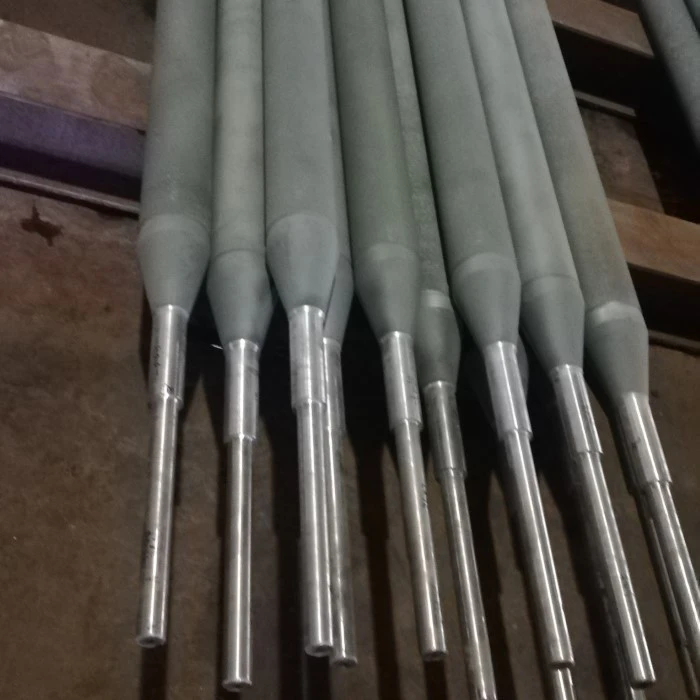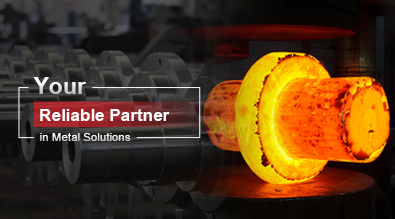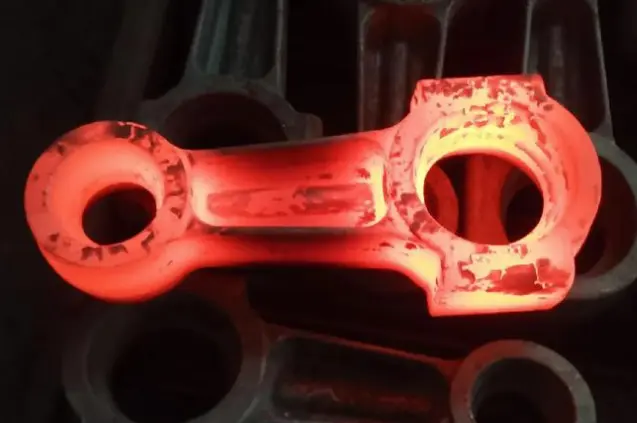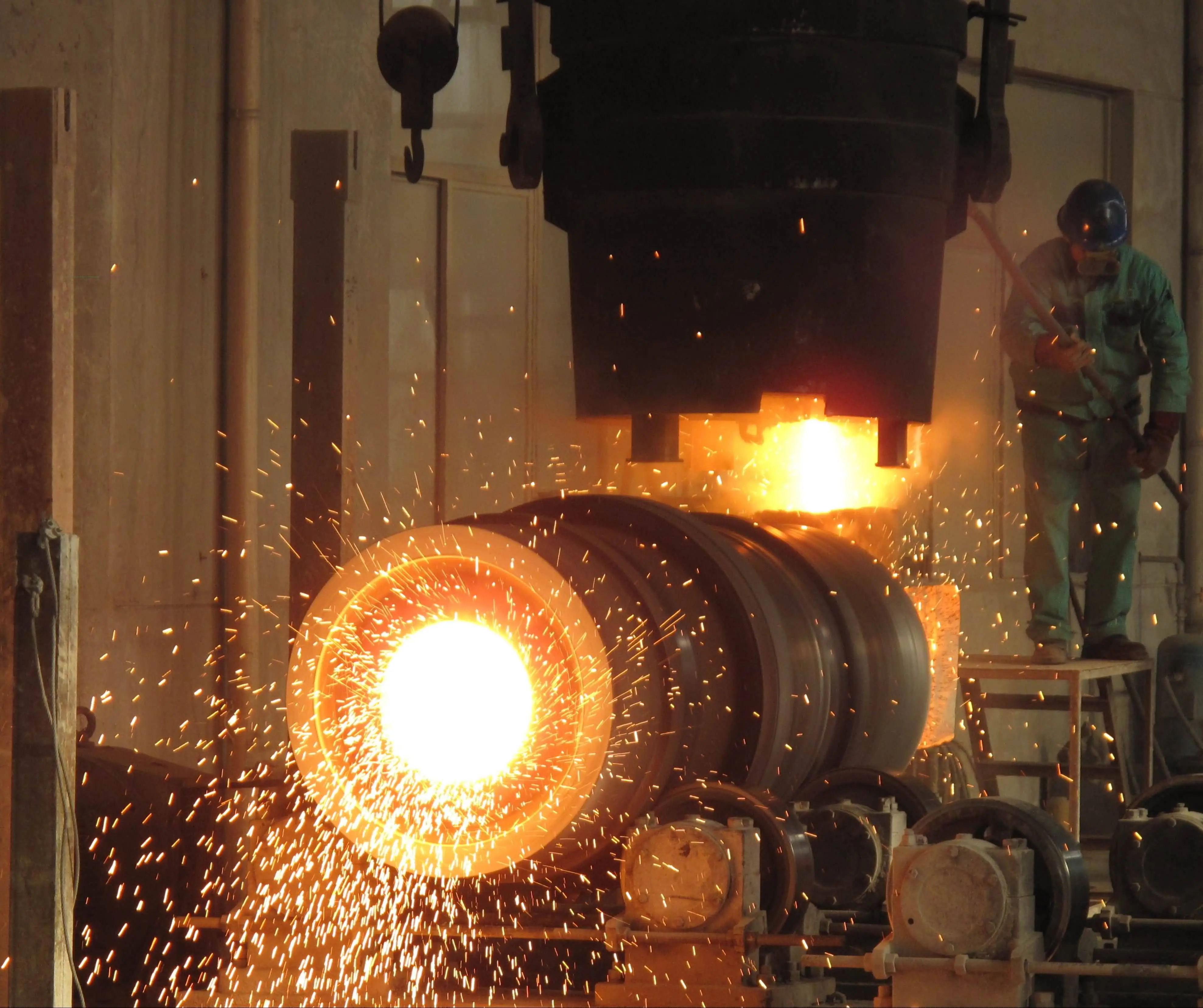Centrifugal Casting: A Revolution in Metalworks
Centrifugal casting has emerged as a groundbreaking technique in the field of metalworking, revolutionizing the way we manufacture cylindrical metal components. This innovative process harnesses the power of centrifugal force to create high-quality, precise, and uniform castings with exceptional mechanical properties. By pouring molten metal into a rapidly spinning mold, centrifugal casting allows for the production of seamless, hollow cylindrical parts with minimal defects and superior structural integrity. This method has gained significant traction in various industries, including automotive, aerospace, and energy sectors, due to its ability to produce complex shapes with improved material utilization and reduced production costs. As we delve deeper into the world of centrifugal casting, we'll explore its unique advantages, applications, and the revolutionary impact it has had on modern metalworking practices.

What are the key advantages of centrifugal casting over traditional casting methods?
Enhanced material properties and structural integrity
Centrifugal casting offers several significant advantages over traditional casting methods, particularly in terms of material properties and structural integrity. The high centrifugal forces involved in the process result in a denser, more compact grain structure, which translates to improved mechanical properties such as tensile strength, hardness, and wear resistance. This enhanced microstructure is especially beneficial for components subjected to high stress or severe operating conditions. Additionally, the centrifugal force helps to eliminate porosity and gas inclusions, resulting in castings with superior soundness and reduced risk of internal defects. The uniform distribution of alloying elements achieved through centrifugal casting also contributes to improved corrosion resistance and overall performance of the final product.
Increased production efficiency and material utilization
Centrifugal casting significantly enhances production efficiency and material utilization compared to traditional casting methods. The process allows for the production of near-net-shape components, reducing the need for extensive machining and finishing operations. This not only saves time but also minimizes material waste, making centrifugal casting a more cost-effective and environmentally friendly option. The ability to produce hollow cylindrical parts without the need for cores further streamlines the manufacturing process. Moreover, centrifugal casting enables the production of bi-metallic or multi-layered components, offering unique possibilities for creating parts with tailored properties. The high production rates achievable with centrifugal casting, coupled with its ability to produce large quantities of consistent, high-quality parts, make it an ideal choice for large-scale manufacturing operations.
Versatility in material and size options
Centrifugal casting demonstrates remarkable versatility in terms of both material selection and size capabilities. This process can be applied to a wide range of metals and alloys, including carbon steel, stainless steel, alloy steel, and super-alloy steel, as well as non-ferrous materials like aluminum and copper alloys. The flexibility in material choice allows manufacturers to select the most suitable alloy for specific application requirements. In terms of size, centrifugal casting can accommodate a broad spectrum of dimensions, from small components with a minimum diameter of 70mm to large castings weighing up to 3000kg and measuring 4000mm in length. With the ability to produce parts with a maximum diameter of 2000mm and a minimum wall thickness of 8mm, centrifugal casting offers unparalleled versatility in meeting diverse product specifications across various industries.
How does centrifugal casting impact product quality and precision?
Improved dimensional accuracy and surface finish
Centrifugal casting significantly enhances product quality and precision by delivering improved dimensional accuracy and superior surface finish. The high centrifugal forces involved in the process ensure that the molten metal conforms precisely to the mold's inner surface, resulting in castings with excellent dimensional stability. This precision is further exemplified by the ability to achieve tolerances as tight as +/-1.5mm, surpassing the capabilities of many traditional casting methods. The centrifugal force also contributes to a smoother surface finish by forcing impurities and gases towards the inner diameter of the casting, which can be easily machined away. This inherent surface quality reduces the need for extensive post-casting finishing operations, saving time and resources while maintaining high product standards.
Reduced defects and enhanced internal quality
One of the most significant advantages of centrifugal casting in terms of product quality is its ability to produce parts with reduced defects and enhanced internal quality. The centrifugal force effectively eliminates gas porosity and shrinkage cavities by pushing these defects towards the inner surface of the casting, where they can be easily removed during subsequent machining processes. This results in castings with exceptional soundness and structural integrity throughout their cross-section. The directional solidification pattern inherent to centrifugal casting also contributes to a more uniform grain structure and improved mechanical properties. These factors combine to produce components with superior fatigue resistance, better pressure-holding capabilities, and overall enhanced performance in demanding applications.
Consistency and reproducibility in large-scale production
Centrifugal casting excels in delivering consistency and reproducibility in large-scale production scenarios. The automated nature of the centrifugal casting process, combined with precise control over parameters such as rotational speed, pouring temperature, and cooling rates, ensures a high degree of uniformity from one casting to the next. This consistency is crucial for industries that require large volumes of identical parts with stringent quality standards. The reproducibility of centrifugal casting also facilitates easier quality control and inspection processes, as the predictable nature of the castings allows for more efficient and targeted quality assurance measures. Furthermore, the ability to maintain consistent quality across large production runs contributes to improved reliability and performance of the final products in their intended applications.
What are the future prospects and emerging applications of centrifugal casting?
Advancements in material science and alloy development
The future of centrifugal casting is closely tied to advancements in material science and alloy development. As new high-performance alloys are developed, centrifugal casting is poised to play a crucial role in their manufacturing. The process's ability to handle complex alloy compositions and achieve uniform distribution of alloying elements makes it particularly suitable for producing components from advanced materials. This includes the casting of super-alloy steels and other high-temperature resistant alloys crucial for aerospace and energy applications. Additionally, ongoing research into the centrifugal casting of composite materials and functionally graded materials opens up new possibilities for creating components with tailored properties across their cross-section, further expanding the range of applications for this versatile manufacturing technique.
Integration with smart manufacturing and Industry 4.0
The integration of centrifugal casting with smart manufacturing principles and Industry 4.0 technologies represents a significant area of future development. Advanced sensors and data analytics can be employed to monitor and control various parameters of the centrifugal casting process in real-time, ensuring optimal quality and efficiency. Machine learning algorithms can be utilized to predict and prevent defects, optimize process parameters, and improve overall product quality. The incorporation of robotics and automation in centrifugal casting operations can further enhance productivity and consistency. Furthermore, the integration of centrifugal casting into digital manufacturing ecosystems will enable seamless communication between design, production, and quality control phases, facilitating faster product development cycles and more responsive manufacturing processes.
Expanding applications in emerging industries
Centrifugal casting is finding new applications in emerging industries, expanding its reach beyond traditional sectors. In the renewable energy sector, centrifugal casting is being utilized for producing large-scale components for wind turbines, such as hubs and main shafts. The process's ability to create hollow, lightweight structures with high strength makes it ideal for these applications. In the field of electric vehicles, centrifugal casting is being explored for manufacturing motor housings and battery enclosures, taking advantage of the process's ability to produce parts with excellent thermal management properties. The growing demand for lightweight, high-strength materials in industries such as aerospace and defense is also driving the adoption of centrifugal casting for producing complex, performance-critical components. As these emerging industries continue to evolve, centrifugal casting is expected to play an increasingly important role in meeting their unique manufacturing requirements.
Conclusion
Centrifugal casting has undeniably revolutionized the metalworking industry, offering unparalleled advantages in terms of product quality, efficiency, and versatility. As we look to the future, this innovative technique is poised to play an even more significant role in meeting the evolving demands of various industries. With ongoing advancements in materials, technology integration, and expanding applications, centrifugal casting continues to push the boundaries of what's possible in metal manufacturing. Its ability to produce high-quality, precise components while optimizing material usage and production costs makes it an indispensable tool in the modern manufacturing landscape.
Shaanxi Welong Int'l Supply Chain Mgt Co.,Ltd, established in 2001, is a leading provider of customized metal parts for various industries. Certified by ISO 9001:2015 and API-7-1 quality systems, Welong specializes in forging, sand casting, investment casting, centrifugal casting, and machining. With a wide range of material capabilities including iron cast, steel, stainless steel, aluminum, copper, zinc, and various alloys, Welong offers comprehensive solutions for diverse manufacturing needs. Their experienced staff and engineers assist in improving and modernizing production processes, ensuring quality control, timely delivery, and cost-effectiveness. With a global presence serving customers in over 100 countries, Welong is committed to being a leader in the international supply chain and advancing China's intelligent manufacturing on the world stage. For more information or inquiries, please contact them at info@welongpost.com.
References
1. Smith, J. D. (2018). Advances in Centrifugal Casting Techniques for Metalworks. Journal of Materials Engineering and Performance, 27(4), 1562-1575.
2. Johnson, R. A., & Williams, T. E. (2019). Centrifugal Casting: Principles, Applications, and Future Prospects. Materials Today: Proceedings, 12, 358-367.
3. Zhang, L., & Chen, X. (2020). Microstructure and Mechanical Properties of Centrifugally Cast High-Temperature Alloys. Materials Science and Engineering: A, 778, 139126.
4. Brown, M. S., et al. (2021). Industry 4.0 Integration in Centrifugal Casting Processes: A Comprehensive Review. Journal of Manufacturing Systems, 58, 205-220.
5. Lee, K. H., & Park, S. J. (2017). Optimization of Centrifugal Casting Parameters for Improved Product Quality: A Case Study. International Journal of Advanced Manufacturing Technology, 89(1-4), 1057-1068.
6. Thompson, E. R. (2022). Emerging Applications of Centrifugal Casting in Renewable Energy Technologies. Renewable and Sustainable Energy Reviews, 156, 111963.

Share your inquiry, get the quotation accordingly!

China WELONG- Your Reliable Partner in Metal Solutions

